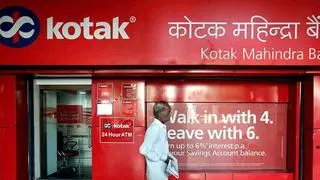The Reserve Bank of India has raised the stake promoters can hold in their banks to 26 per cent from 15 per cent now. The RBI has also given small finance banks (SFBs) more time to list as part of its move to align regulations to meet the requirements of a dynamic banking landscape.
These are part of 21 recommendations of an Internal Working Group (IWG) that have been accepted by the RBI, with modifications. The IWG had made 33 recommendations. The central bank said the remaining 12 are under examination.
The hot button issue of allowing large corporates/industrial houses to promote banks, as proposed by the IWG, did not find mention in the RBI’s statement on Friday.
The recommendation on allowing promoters to hold 26 per cent stake in their bank will prove beneficial for the promoters of banks such as Kotak Mahindra, IndusInd, Bandhan and some SFBs, say analysts. . This would be uniform for all types of promoters and would allow promoters, who have diluted their holding to below 26 per cent, also to raise it. The promoter can choose to bring down the holding to below 26 per cent, any time after the five-year lock-in.
The minimum requirement on the experience track record of the promoting entity, including for a converting non-banking finance company (NBFC), is to remain at 10 years for Universal Banks and five years for SFBs.
However, the RBI is examining IWG’s recommendation that well-run large NBFCs, with an asset size of over ₹50,000 crore, including those owned by a corporate house, be permitted to convert to banks provided they have completed 10 years of operations
Ashvin Parekh, Managing Partner, Ashvin Parekh Advisory Services, said: “The move to increase the cap on promoter shareholding to 26 per cent will give more stability to private sector banks. Deposit holders will also draw comfort from the fact that the promoter is committed to the bank and will make good on any capital requirement.
“I subscribe to the school of thought that corporates should not be given bank licences as businesses tend to have a cyclical nature and can lead to a liability risk and impact the bank. However, the RBI could have moved towards giving bank licences to some large professionally run, non-corporate NBFCs as an experiment,” he said.
The central bank set a track record requirement of five years for Payments Bank (PB) intending to convert into an SFB (earlier recommendation was three years).
The RBI said small finance banks should be listed within eight years of commencement of operation. The IWG had recommended that SFBs should be listed within ‘six years from the date of reaching net worth equivalent to prevalent entry capital requirement prescribed for Universal Banks’ or ‘ten years from the date of commencement of operations’, whichever is earlier.
The central bank said Non-Operative Financial Holding Company (NOFHC) should continue to be the preferred structure for all new licences to be issued for Universal Banks. However, an NOFHC may be mandatory only in cases where the individual promoter/promoting entities/converting entities have other group outfits.








Comments
Comments have to be in English, and in full sentences. They cannot be abusive or personal. Please abide by our community guidelines for posting your comments.
We have migrated to a new commenting platform. If you are already a registered user of TheHindu Businessline and logged in, you may continue to engage with our articles. If you do not have an account please register and login to post comments. Users can access their older comments by logging into their accounts on Vuukle.